Bills filed for a one-year pause on academic distress labels; combine school and other votes
by May 18, 2016 4:08 pm 180 views

A bill filed for the upcoming special session would place a one-year moratorium on the state declaring schools to be in academic distress, while another would combine school and general elections when both occur in November.
House Bill 1001 by Rep. Bruce Cozart, R-Hot Springs; and Sen. Jane English, R-North Little Rock, prohibits the Department of Education from identifying schools as being under academic distress for the 2016-17 school year, though the department can remove schools from that classification.
The bill was written in the wake of last year’s passage of the federal Every Student Succeeds Act, which requires the state Department of Education to work with the U.S. Department of Education to create new accountability systems. As that change is occurring, “a pause in current state accountability identifications and classifications is necessary,” the bill says.
Cozart said Education Commissioner Johnny Key requested the bill. In an interview, Key said the Every Student Succeeds Act requires states to submit new accountability plans that differ from requirements under No Child Left Behind, the previous accountability system. The new system will better align the state and federal accountability systems and includes more input from educators and communities, Key said.
Another reason for the pause is that, in addition to changes under ESEA, schools are changing year-end testing from the controversial PARCC Assessment to the ACT Aspire. The previous year, students took the Arkansas Benchmark Exam. Academic distress is based on a three-year average.
“Statistically, it could still be done, but since we have a pause or a breather from the federal side, it just makes a lot of sense to allow that on the state side, too,” Key said.
Dr. Richard Abernathy, executive director of the Arkansas Association of Educational Administrators, which includes school superintendents, supports the bill.
“That’s something that’s common sense, that needs to be done,” he said. “You cannot, in our opinion, hold schools accountable when they’re taking and trying to measure similarities on three different assessments.”
The department also would be prohibited from assigning A-F school ratings this year as part of the legislation. Key said the department will work to analyze what the system will need to look like under the Every Student Succeeds Act. The grading system would include other measures of student success under than test scores.
Meanwhile, Senate Bill 1, by English, amends her law passed in 2015 that gave school districts the option to hold elections on the traditional third Tuesday in September or on the same day as general elections, which occur the first Tuesday following the first Monday in November.
Under that law, school districts would have to print separate ballots for a November election, and some voters would have to vote at separate locations. That will be the case in the Pulaski County and Helena-West Helena School Districts, where elections will be held in November to elect new school board members as those districts regain their independence from state takeover, where they have been since 2011.
The bill says that if school elections and general elections occur at the same time, they “may be printed on the same ballot.” Polling sites “shall be the same.” English said the intent is for both to be required.
School districts would be required to reimburse counties for additional costs incurred, including paying the entire cost when a school runoff is the only runoff required.
The Pulaski County and Helena-West Helena November elections were set by Key, who has that power as those districts’ de facto school board. Key said he chose November in order to increase voter participation. In Helena-West Helena, the local community advisory board asked him to do so. Key said that he had long been in favor of November school elections to increase turnout.
November elections are an option under the 2015 bill. Abernathy and Key said they knew of no school districts that were voluntarily moving their elections to November this year.
